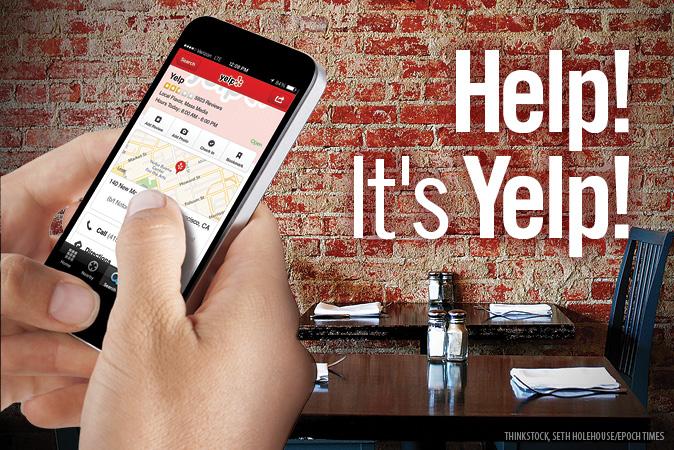Not too long ago, finding a business meant turning to the Yellow Pages. Small-business owners would start the name of their business with the letter “A” or “AA” to be first to catch the eyes of prospective clients.
Now it’s all online, and user-generated reviews are the go-to source for advice on where to eat and shop.
For small-business owners, whose livelihoods are directly affected by the virtual sticks and stones, checking one’s rating has become a preoccupation ridden with anxiety.
The website Yelp in particular has drawn frustration and ire in the past several years.
“Yelp is going around writing reviews condemning people that don’t advertise with them and saying these reviews are real. The second thing, Yelp is hiding reviews to make your overall score go down,” said Attorney Lawrence Murray, of Murray & Associates in San Francisco. Murray represents small businesses who brought a class action case against Yelp in 2010, Levitt v. Yelp! Inc.
“Yelp is putting too many good businesses out of business,” Murray said. “The Communications Decency Act [CDA] says that if you’re an Internet provider and all you do is give people access to the Internet to post things you have no liability. What the CDA does also say, is if you commit a crime, then you have no immunity.”
The plaintiffs argue the CDA does not protect Yelp because, “these guys are out there committing extortion,” Murray said. “The mafia would be grateful to have [had] this lesson years ago; they couldn’t go to jail. They’re doing the same extortion as the mafia.”
A federal judge disagreed and dismissed the case in 2011. An appeal is still pending.
Murray said he hears from businesses at least twice a week who claim that Yelp is trying to extort money from them. “Everybody is told, ‘If you want your good reviews to come back and your bad reviews to get lost or get pushed out or not get counted, pay us money.’”
According to a Freedom of Information Act request filed by the Wall Street Journal, Yelp.com had amassed more than 2,000 complaints with the Federal Trade Commission from 2008 to March 4 of this year.
Review Anomalies
Epoch Times spoke to small-business owners across the country and in different industries, and the Yelp story rings true for those who have declined advertising: several days after hanging up the phone, positive reviews are filtered onto a not-recommended page, and negative reviews, sometimes fake, are prominently displayed on the main profile page.
Mina Shafie of Los Angeles, Calif., has a 4-star rating for her bridal couture studio, Mina Design and Tailoring. She works with clients one on one.
She has received advertising calls from Yelp from 2009 up until about a year ago.
“In 2009, they made a call asking me to advertise with them. They told me I could manage my negative reviews if I advertised with them. I said, I don’t have any negative reviews, and the girl told me, yeah, you don’t have it now. But you will. And then a couple of weeks after, a negative review showed up and then each time they called, another negative review showed up.”
The reviews didn’t make sense. “They may say I was rude, but I don’t know them, I don’t recognize them,” said Shafie. She has 85 positive reviews, from customers she knows, that have been deemed by Yelp as not-recommended. Her main profile features 26 reviews. She is careful to copy and save the positive reviews as soon as they go up on the profile page, before they end up on the not-recommended page.
Yelp PR specialist Hannah Chessman responded to queries via email, “There has never been any amount of money a business can pay Yelp to manipulate reviews, and our automated recommendation software does not ‘punish’ those who don’t advertise.”
“If you can share the names of the businesses you’re talking to, I’m happy to see if there’s any additional information I can provide that would be helpful for your story,” Chessman wrote.
Behind the Scenes
About 16 percent of restaurant reviews on Yelp are fake, as well as more extreme than other reviews, according to a 2013 study by Harvard professor Michael Luca and George Zervas.
Yelp said one way it protects consumers from fake reviews is through a guarded algorithm that relegates reviews it deems untrustworthy to a page of “not currently recommended reviews,” which users can see by clicking on a link at the bottom of a business’s Yelp profile.
The why, how, and when of the filtering is what has small-business owners scratching their heads or banging them against a wall.
Epoch Times spoke to an owner of a Midtown restaurant, who would only speak on condition of anonymity for fear of negative retribution from Yelp (we’ll call him John B.).
John B. has always declined advertising with Yelp—and he’s convinced he gets penalized. “As soon as you get off a sales phone call you lose a couple of 5-star reviews.”
Those 5-star reviews inexplicably move to the not-recommended page—which, he has been told, sales representatives have no control over. The filtering is done automatically by an algorithm.
Or, he said, after a sales call, a negative review would pop back up on the main page. “They pop on, they pop off—you'd think filtered means filtered.”
John B. said Yelp’s selling efforts have changed over time. He said three or four years ago Yelp “would tell you they would get rid of the bad reviews,” if you advertised with them.
Then, he noticed a shift. “They had to change because people got wise to it. They switched their advertising sales tactics.”
Now, when he gets a sales pitch, the first thing he’s told upfront is that Yelp will not remove a review. “The girl was reading it off a page. It’s this whole long spiel.”
He has asked sales representatives if he could speak to someone about these reviews and how they’re calculated.
“They‘d say, hey we have 20 million businesses on Yelp around the world and there’s no one to speak to you. It’s just too complicated. And I said but you have enough people to speak to 20 million businesses but you don’t have enough people to explain the algorithm to me, how it works. And they’d hang up the phone.”
If John B. is flummoxed by the algorithm, it’s also because he gets fake reviews that are not filtered out—reviews that don’t factually match the circumstances or time. Any of the five owners are present in the restaurant at any given time, and they are careful to do incident reports at the end of every night.
He said Yelp salespeople usually call when his restaurant’s rating is on the cusp of 3.5 or 4 stars. He mentioned two occasions when he got advertising calls within hours of his rating dropping from 4 stars to 3.5 stars. He raised the matter, to be told it was, again, the algorithm.
“It’s a form of extortion, kind of like a digital mafia of sorts,” he said. “I think the whole thing is crooked. ...Yelp is such a misrepresentation of what our place is.”
A Matter of Stars
It might seem a small matter of half-stars, but those make a difference. Yelp rounds off the average rating to the nearest star: a restaurant that averages 3.24 will show up with a 3-star rating, while a rating of 3.26 will round up to 3.5 stars.
A restaurant whose 3-star rating improves to 3.5 stars increases its chance of selling out during prime dining times from 13 percent to 34 percent, according to a 2012 study by UC Berkeley professors Michael Anderson and Jeremy Magruder published in the Economic Journal.
John B.’s business is in a transient neighborhood. “[People] pull out their mobile phones and all the 4-star reviews will show up on the first search. They’re the first people who show up, then everybody else. So they’re affecting me directly,” he said.
He’s found OpenTable to be far more accurate and thoughtful in the kinds of postings he gets, unlike the more extreme types of reviews he sees on Yelp (extremely happy, or extremely unhappy). On OpenTable, diners who made a reservation get an email the next day asking to evaluate their experience by ambiance, food, service, and have the option of writing a review. “And we know who it was,” John B. said.
Yelp Users
Launched 10 years ago, Yelp’s business model is predicated mostly on revenue from local advertisers placing ads on the site, as well as advertising by some larger brands. It has yet to turn a profit.
“We do not expect to be profitable in the near term as we anticipate that our operating expenses will increase significantly in the foreseeable future,” Yelp reported in its Form 10-K filing to the U.S. Securities and Exchange Commission on March 3.
By the end of 2013, Yelp counted an average of 120 million unique visitors and more than 53 million reviews.
Small-business owners say Yelp is alienating its base of prospective clients. And there are whole websites devoted to critiquing it.
But Yelp also has its devoted users, and encourages its Elite Squad reviewers through a series of freebies, praise, and parties, organized by a so-called community manager in each of its markets.
Yelp’s own Yelp review rating is at 2.5, featuring mostly extremist reviews from both sides of its 5-star spectrum: bitter 1-star reviews from beleaguered business owners and reviewers (who see their write-ups disappear), and elated 5-star reviews, many from reviewers who thank the company for giving them a good time, and sometimes, helping them find a community and meaning in life.
Filtering Reviews
Timothy Wong said he’s a relatively happy customer of Yelp; and he has paid for advertising for a few years. Even so, he said, it is a double-edged sword.
He maintains a 5-star rating, and knowing that he and his staff are under public scrutiny via social media certainly makes them work harder to provide good service. Being in the pest management industry, he said it’s not that easy to get reviews in the first place. “People don’t want to admit having a ‘bedbug’ problem. It’s like saying, ‘I have herpes. I’m going to be on OK Cupid now that I’m cured,” he said.
His business, M&M Environmental on the Lower East Side, keeps a recording of every person who calls; and given the nature of the work, they know exactly who their clients are.
He sees Yelp’s filter as a good and bad thing. On the one hand, filters limit fake or nonactive users from posting random reviews. But, on the other, the fake negative reviews can be written in an “over the top” fashion, inviting other readers to click “cool” or “funny,” making it less likely to be filtered, he said.
Sometimes he gets reviews that are fake or from people who were never customers. Yelp’s terms of service and content guidelines say reviews should come from people who were actual customers.
There was a review from a user who has never used Wong’s service: “Don’t be blinded by these high Yelp reviews. I had a wonderful experience with another exterminating company at 1/3 the price.” It was voted as “useful” by 11 other Yelp users.
In the past, Wong would submit these types of fake reviews to Yelp, and he would be told they would be submitted to a “review committee.” That option is no longer available. He now has the option of sending a private message or to respond publicly.
There is no one at Yelp that he can talk to to remove a review that is not legitimate.
“You’re talking about zero recourse in what I can do,” he said. Unlike Shafie, who goes to great lengths to defend herself on her Yelp page, he doesn’t want to engage in a public debate. “We choose not to dignify any fake bad reviews because that would make the review active, because the public would find that review cool or funny,” he wrote in an email.
John B. does not respond to negative comments, either. He finds the discourse on Yelp altogether too extremist and lacking in nuance and specifics. “It’s like, I had the best time ever. This was an amazing place ever. Or, this was the worst place ever.”
Legal Issues
The 1996 Communications Decency Act protects providers of Internet services from being held responsible for their users’ words or actions. (“No provider or user of an interactive computer service shall be treated as the publisher or speaker of any information provided by another information content provider.”)
But that hasn’t stopped small-business owners from challenging Yelp through lawsuits.
In July 2012, Joe Hadeed, the owner of a carpet cleaning business in Alexandria, Va., sued several reviewers for defamation and asked Yelp to turn over their identities. Yelp refused on the basis of the First Amendment, but so far both the Alexandria Circuit Court and the Virginia Court of Appeals have ordered Yelp to reveal the identities of the reviewers.
“The freedom of speech—and within this, the freedom to speak with anonymity—is not absolute,” states the Virginia Court of Appeals decision. “If we assume that the Yelp reviews of Hadeed are lawful, then the John Does may remain anonymous. But if the reviews are unlawful in that they are defamatory, then the John Does’ veil of anonymity may be pierced, provided certain procedural safeguards are met. This is because defamatory speech is not entitled to constitutional protection.”
Yelp has appealed the decision. The Virginia Supreme Court is due to grant or deny Yelp’s appeal later this month, or schedule a hearing, said the Wall Street Journal.
Legalities aside, Wong raised the question of responsibility. “If Yelp is not policing themselves, no one is policing them. Companies like this have a moral responsibility.”
For small-business owners, he said, “We live and die by Yelp.”





